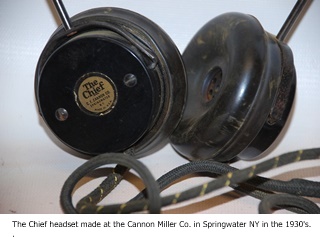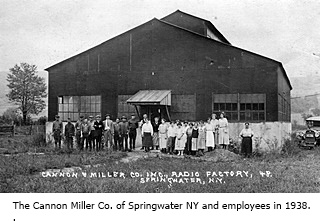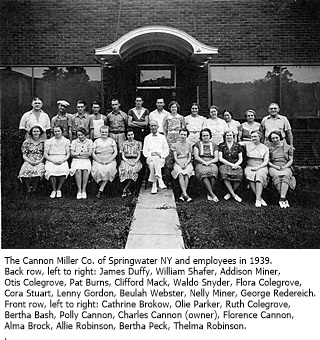
Welcome to Hemlock and Canadice Lakes!
Barns Businesses Cemeteries Churches Clinton & Sullivan Columns Communities Documents Events Time Line Fairs & Festivals Farm & Garden Hiking Homesteads Lake Cottages Lake Scenes Landscapes Library News Articles Old Maps Old Roads & Bridges Organizations People Photo Gallery Podcasts Railroad Reservoir Schools State Forest Veterans Videos
|
Business - Cannon Miller Company of Springwater NY |
Click any image to enlarge. |
|
The Cannon - Miller Manufacturing Co. By Ried Robinson in 19xx. 1 “The Chef” earphone headset made in Springwater NY. On August 23, 1919, two families arrived in Springwater from Buffalo in a crowded Ford touring car. Mr. Edmund Miller relates that in the car was his wife, Ethel and their daughter, Dorothy; along with Charles Cannon, his wife, Mary, and two daughters, Florence and Polly, a bird and bird cage and other articles “tucked” in wherever there was room. By prearrangement, Frank Stuart, who was in Buffalo to market a truckload of sheep, on his return trip, loaded the household goods of both the Cannons and the Millers onto his double-deck sheep hauling truck and brought them to Springwater. Miller and Cannon became acquainted when they were employees of the Buffalo Telephone Company. Cannon was the treasurer of the company and Miller was employed as an engineer and draftsman. Cannon became familiar with this area on his visits to the Colegroves on Canadice Lake as a vacationist. In discussing the possibility of forming a company, Miller, who understood the construction of the telephone receiver, pointed out that there was very little difference between the active parts of a telephone receiver and the proposed earphone. Once the decision to form the company was made, a suitable place must be found to start the manufacture of their product. Cannon suggested that a small town where the rents would be low would be most desirable, if one could be found. Through the Colegroves, they learned of the unused mill in Springwater. The die was cast and Springwater became the fortunate location. 2 The Cannon Miller factory in Springwater NY in 1938. Mr. Miller and his family rented the house of Henry Brewer, which Ronald Allen now owns, at a rental of $4.00 per month. Mr. Cannon and his family rented the back part of the Kate Hendershott Millinery Shoe, which now is Gary Robinson’s restaurant. Miller relates that they came into Springwater by way of the Slaughterhouse Hill Road (the dirt road north of Francis Lorenzos’) and not being accustomed to traveling on such steep roads, found the experience rather an unpleasant one. About two months after their arrival in town, the two newcomers began the manufacture of headphones or headsets in the old mill located back of Violet Kline’s, which they were able to rent from Elwood Barringer for $5.00 per month. Some of the first employees were Waldo Snyder, Hugh Shafer, Daniel Shafer, William Shafer, John Swick, Avery Barnum, Beulah Barnum, Lester Miner, Ray Snyder, Shortie Reynolds, Phil White, Flora and Earl Colegrove, Mary Clayson, Hadley Snyder and his wife, Mrs. James Snyder. Early customers of the new company were Brander’s, for whom they made headphones, and Hamburg Brothers, for whom they made cone speakers and headsets. During the first year they were in business, Cannon and Miller paid themselves $5.00 per week from the sales of the business. The Brogan family in Dansville wound coils for the company. 3 The Cannon Miller factory in Springwater NY in 1939. Due to a rapid increase in business, expansion became necessary. The town provided a building lot and a part of the present building was erected in 1922. In 1926 through 1929, the company rented the Morris and Grover store building now owned by Emil Hosenfeld. Joseph Hunt went on the road as a traveling salesman for the company. The partnership was dissolved in 1929 when Miller sold out to Cannon, and Miller began the manufacture of metal fishing lures in the Morris and Grover building. Charles Cannon continued as president of the Cannon and Miller Company until his death in 1960. Since that time, his sons-in-law, Arthur Shriner and Hudson Brewer, have carried on the business in a very successful manner. Cannon and Miller headsets are used in the United Nations Building, hospitals, airplanes, and schools, which have become one of the most important outlets for the headsets. The company, for nearly fifty years, has been a considerable asset to the Springwater community by providing employment for many of its residents. At present the company employs about fifty individuals of whom most are local. Miller, in his new venture, continued the making of the Min-Nix line of metal lures (the trade name used by Nixon). Roy Nixon, for a few years before, who was a local resident, designed and made a few types of metal lures, but did it more as a sideline rather than devoting his full time it. However, Miller shortly dropped the “Min-Nix” line and continued the business with the manufacture of spinners, trout spoons and wobblers of his own design. One of his most successful metal lures was a wobbler origi¬nated by Scott N. Robinson, a local fisherman. This wobbler was designed in several sizes by Miller and has become widely known as an excellent lure for pickerel, northern pike and muskellunge. Miller sold the business to Robert Strawberg in 1957, who has continued the manufacturing of the Miller line of metal lures under that trade name. Strawberg was found dead in 1969. The place was sold in 1970 to Emil Hosenfeld, who had a wood working shop, refinishing and repairing furniture.
|
||
|
The Cannon - Miller Manufacturing Co. By an Unknown Author in January 1982 In 1919, Charles F. Cannon, Treasurer of Frontier Telephone Co. in Buffalo, and Edmund J. Miller, Manufactring foreman in the same company, came to Springwater and formed Cannon & Miller Company to manufacture radio headsets. Springwater was selected because of Cannon having spent several summer vacations at Canadice Lake and liked the area. A vacant mill, owned by a Mr. Barringer, was rented at $5 per month. After a year, the mill was purchased for $1600. This mill was located between School and South Main streets behind the Kline residence Radio headphones had been made by Frontier Telephone in Buffalo and after the war was over in 1919, and expansion in sales of radio sets created a similar market for radio headphones which were required for listening, loud speakers not yet having been invented. The first radio broadcasting was started by Station KDKA of Westinghouse in Pittsburg in 1920, and there after the demand for headphones required a work force of sixty to seventy employees in the Springwater factory. Headsets were made under contract with C. Brandes of New York City who were one of the largest merchandisers in the country. Under steadily increasing demand, the factory was built on the present location at 8058 South Main St. This was the rear part of the present building. To help finance this expansion, people in the village endorsed a note for $2000 to purchase machinery and materials. They also gave the lot for the building at a cost of $1600 which was purchased from the then owner, George W. Whitehead of Niagara Falls. The company continued to make headsets for Brandes exclusively for two or three more years but could not make enough for their requirements, so Brandes started their own factory in New York City. Cannon and Miller Co. then began manufacturing for several other concerns and there after headphones were made and sold under the Cannon and Miller name. During this period, not enough help was available in Springwater and arrangements were made to have ten people working in Dansville. A contract was then made to supply headphones under the Crosley Radio Corp. name which required additional facilities so a factory was also operated in Wayland at that time. This business continued for three or four more years until the loud speaker became into general use which replaced headphones on radio sets. With reduced demand for headphones, the Wayland plant was closed. In 1926, a horn type loud speaker was developed by the company but before it could be put on the market, the cone type speaker was then introduced and manufactured by the company which was popular for three or four years. In 1930, Edmund Miller sold his interest to Charles Cannon and the company was thereafter known as C. F. Cannon Co. The front brick part of the building was then built at a cost of over $10,000 so that all operations could be done in the same plant. The machine department had continued to be operated in the old original building. Business continued on a small scale during the depression years for both headsets and speakers and among orders received was one for 10,000 speakers for installation in the Statler Hotels. Kolster Radio Co., which owned the Brandes company, then went bankrupt, and C. F. Cannon Co. purchased their entire inventory of parts and tools valued at over $100,000. The company then continued to manufacture and market the Brandes line as a regular product line in addition to the Cannon line of headsets and speakers. The Brandes headset was the leading one in the United States, had been heavily advertised and was in great demand. This acquisition made Cannon Co. the foremost manufacturer of headsets in the world and customers included leading radio manufacturers, distributors, chain stores, mail order houses, schools, hospitals and prisons, and were exported to other countries throughout the world. During World War II, the factory was operated at full capacity manufacturing headsets for the armed services. Because of their importance in communications, a high priority was given by the Government so that necessary rationed scarce materials could be obtained. Manufacture of loud speakers was then discontinued. From 1946 to 1951, the business was adversely affected by the wholesale dumping of war surplus headsets on the market at a fraction of cost and during this period, sales and employment were at a low ebb. In 1950, C. F. Cannon sold the business to a partnership consisting of Florence Brewer, Hudson Brewer, Mary Shriner and Arthur Shriner. Phones were developed for toy use and for many years, over 100,000 per year were sold to the toy industry. Headsets were also sod to Veterans Administration hospitals, prisons, radio kit manufacturers, through catalog houses such as Allied Radio Corp. in Chicago, and to manufacturers of metal detectors, geiger counters, etc. and were also exported to South America, China, India, South Africa, Mexico and other countries. Large quantities were also used in schools throughout the country for teaching group sessions in languages and other classes. During this period, up to 50 people were employed in manufacture of the braided cords, machine shop, plastic molding, coil winding, and assembly operations, and some 3,000 headsets were manufactured and shipped weekly. The majority were of the monaural magnetic type and stereo headsets were also manufactured. Sub-contract work was also done in special coil winding and machined parts for other manufacturers. Charles Brewer, son of Hudson and Florence Brewer, became a partner in the company in 1970. During the 1970’s many large customers such as Allied Radio Corp. in Chicago, the nations largest electronic mail order firm, disbanded their manufacturing subsidiary, Knight Electronics Corp., and began purchasing their products fro Japan. In the late 1970’s the headphone business steadily declined in the face of Japanese, Hong Kong and Taiwan imports at much lower prices than they could be manufactured in this country. In 1977 a corporation was formed to utilize excess space and reduce overhead factory expense. The corporation was jointly owned by Cannon partners and John P. Coley of Wayland. Coley Wood Products Co. with John P. Coley as president, occupied half of the factory space for finishing wood salad bowls and other wood gift items such as kitchen utensils, knife blocks and other wood gift items such as kitchen utensils, knife blocks, coffee grinders, altogether some 200 items, which were sold to gift shops, department stores etc. Some small bowls were also manufactured here. Larger bowls were purchased from factories in Michigan, Vermont, and the Woodcroftery Shops in Wayland and finished here. In 1979, Charles Brewer purchased the interest of John Coley and became president of the wood business. Later in 1979, Woodcroftery Shops in Wayland went out of business and to be assured of a continued supply of wood bowls, Coley Wood Products Co. purchased the machinery of Woodcroftery and moved the wood business to the Wayland plant on Second Ave. Name of the company was then changed to Country Wood Products Co. At the end of 1979 the machinery of C. F. Cannon Co. was sold to J. H. Ambrose Co., Chapin Road, Canandaigua, N. Y. who had been purchasing headsets for many years and adapting them for use in prisons, and they are continuing their manufacture. Operations were discontinued in December of 1979 in the Springwater facility and the building offered for sale.
|
||


